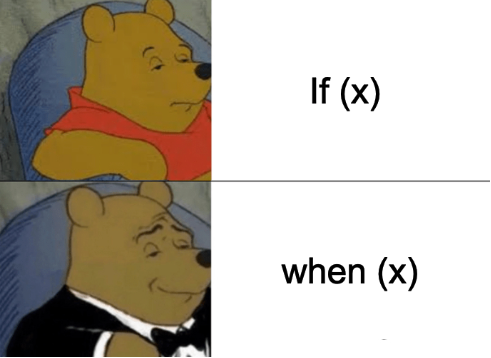When expression
A large part of computer programming is performing an action when a pattern matches.
Usually, this condition can be represented by if expression, however, when you have more than two or three choices to make, when expression are much nicer than if expression.
if (a == 0) print("a is zero")
else if (a == 1) print ("a is one")
else print ("a is neither zero nor one")
when (a) {
0 -> print("a is zero")
1 -> print("a is one")
else -> print("a is neither zero nor one")
}
when expression makes the above code cleaner and more readable.
When + Set
Many time, we will put a variable in the when expression. Do you also know that we can also match a Set of values against another Set of values as below
fun mixColors(first: String, second: String) =
when(setOf(first, second)) {
setOf("red","blue") -> "purple"
setOf("red","yellow") -> "orange"
setOf("blue", "yellow") -> "green"
else -> "unknown"
}
print(mixColors("red", "blue")) // purple
When expression without argument
when has a special form that takes no argument. Omitting the argument means the branches can check different Boolean conditions.
val age = 17
val category = when {
age < 17 -> "underage"
age < 25 -> "young adult"
else -> "adult"
}
Conclusion
The expression when is overall a more elegant way to choose between several options.
